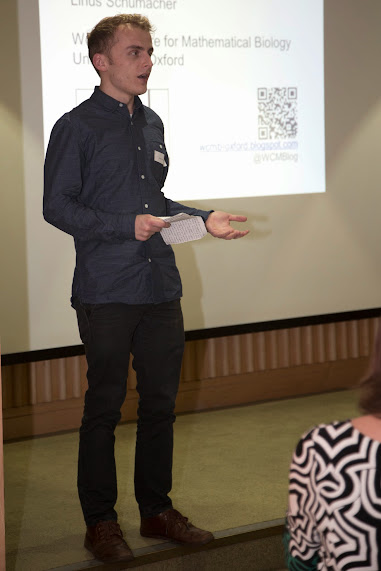This January I had the opportunity to present a research scientist's perspective on the future of science and publishing at the British Library in London, as part of an event hosted by writeLaTeX. My outlook for 2014 and beyond was, in summary:
- There’ll be more scientists working as translators, or connectors, between disciplines.
- We’d like even better software for communicating and sharing data with our collaborators, especially for those overseas.
- A hope that more biologists will use tools for collaborative writing, as well as preprint servers.
- How are we going to acknowledge conceptual insights from extradisciplinary ways of thinking as contributions to joint research?
 |
| A one slide talk. More photos from the event. |
Afterwards, I was offered the chance to expand on these thoughts in a guest post for the Nature jobs blog. I quickly noticed that I was one of three to post about these issues in the space of three days, joined by Sarah Byrne and Philip Gerlee, all three summarised by David Basanta. As I had drawn heavily on the experience of colleagues and peers in my talk and post, it was not too surprising to see similar ideas expressed elsewhere.
One of the specific issues I talked and wrote about was that there were perhaps too few career examples to follow for someone becoming a connector:
"This new connector-niche presents an opportunity for pluripotent interdisciplinary researchers to stay undifferentiated, but also a risk of undetermined career fate decision. The problem is that we lack example career paths of these connectors’ that scientists in training can follow."So we need more lineage tracing data (to continue the metaphor). As it happened, just a few days after the above mentioned blog posts, the website myscicareer.com launched as a place for first-person science career stories. It currently features more than a dozen examples of research and other science careers, and it would be great to see some stories of connectors there. So if you are a scientist with an unusual career path, or know someone with an interesting story, please do contact myscicareer to contribute.
I was diagnosed as HEPATITIS B carrier in 2013 with fibrosis of the
ReplyDeleteliver already present. I started on antiviral medications which
reduced the viral load initially. After a couple of years the virus
became resistant. I started on HEPATITIS B Herbal treatment from
ULTIMATE LIFE CLINIC (www.ultimatelifeclinic.com) in March, 2020. Their
treatment totally reversed the virus. I did another blood test after
the 6 months long treatment and tested negative to the virus. Amazing
treatment! This treatment is a breakthrough for all HBV carriers.
I was diagnosed with Idiopathic Pulmonary Fibrosis (IPF) four years ago. For over two years, I relied on prescription medications and therapies, but unfortunately, the symptoms continued to worsen. My breathing became more laboured, and I experienced increasing fatigue and shortness of breath with even minimal activity.Last year, out of desperation and hope, I decided to try an herbal treatment program from NaturePath Herbal Clinic.Honestly, I was skeptical at first, but within a few months of starting the treatment, I began to notice real changes. My breathing became easier, the tightness in my chest eased, and I felt more energetic and capable in my daily life. Incredibly, I also regained much of my stamina and confidence. It’s been a life-changing experience I feel more like myself again, better than I’ve felt in years.If you or a loved one is struggling with IPF, I truly recommend looking into their natural approach. You can visit their website at www.naturepathherbalclinic.com
ReplyDelete